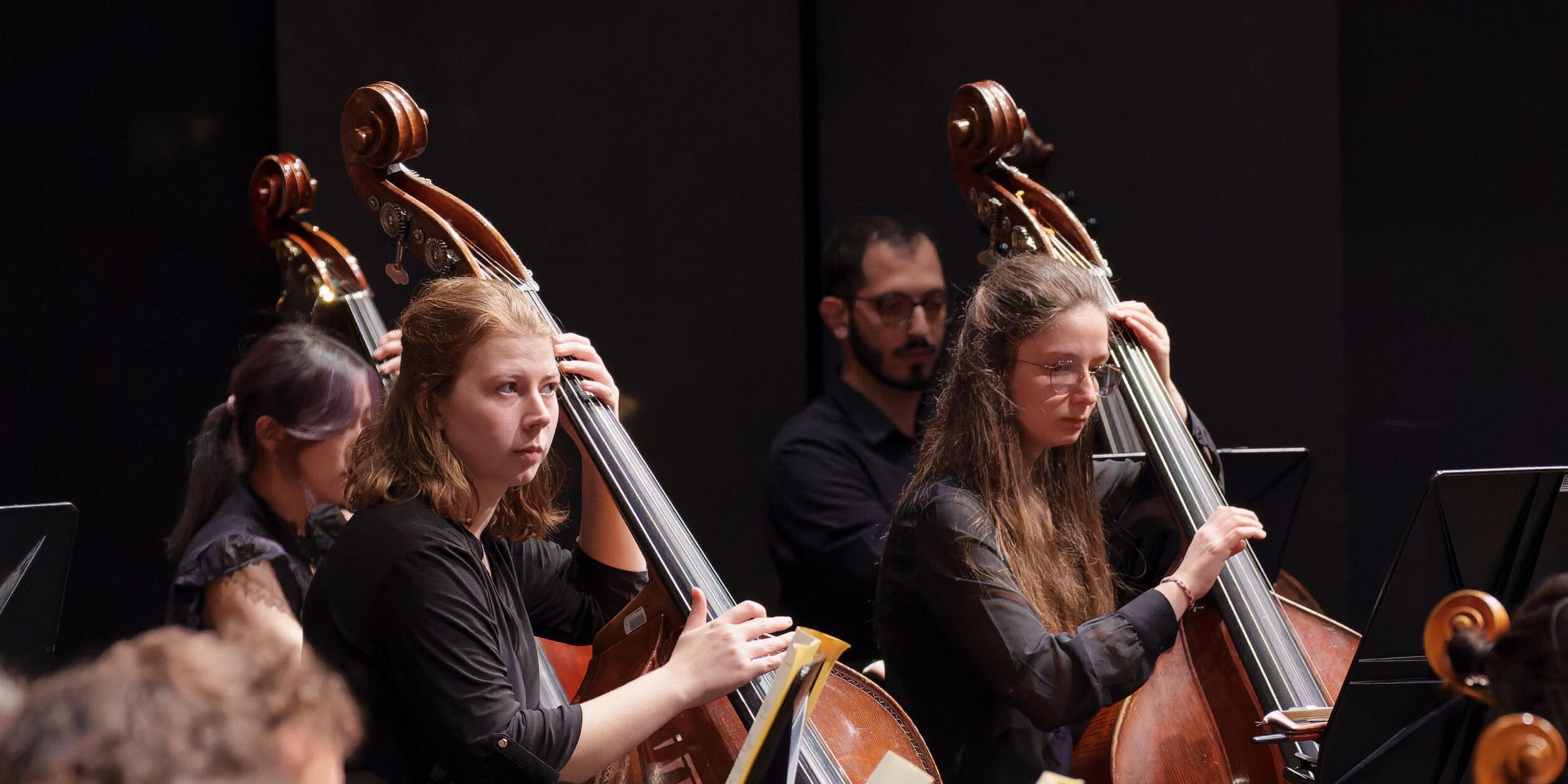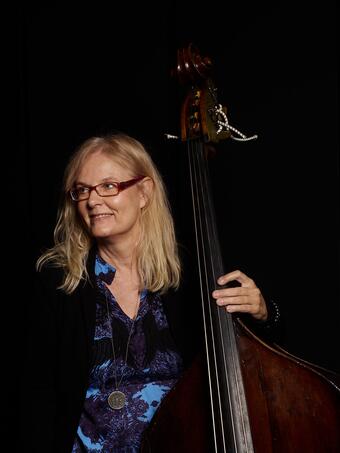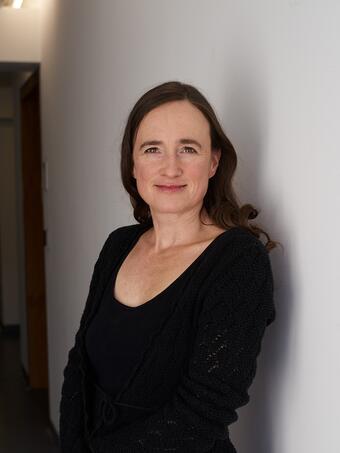Double Bass

Overview
In four semesters, the master's programme in double bass teaches artistic development at an international level and prepares students for a smooth transition to life as a professional musician. Students will also learn to master the academic techniques necessary for analysing, interpreting and elaborating upon artistic content in writing.
Department of Studies & Examinations
+43 676 88122 492
studienabteilung@moz.ac.at
Duration of course
4 semesters / 120 ECTS credits
Language of Instruction
German
Application period
1.2.–28.2.2025
Auditions
summer semester each year
dates see at "Audition dates"
overview of all dates
Downloads
General information
The focus of this degree programme is on further developing and deepening the practice-oriented academic and artistic skills already acquired in a subject-related Bachelor's degree, thus preparing students for a performing career. The MA in Performance qualifies students for professional practice in the following fields:
- Soloist
- Chamber musician
- Orchestral musician (e.g. in chamber/opera/symphony orchestras, orchestras and ensembles for contemporary music, ensembles for historical instruments)
- Freelance artist
The curriculum is competence-oriented. After completing the Master's programme, students should:
- master their instrument at the highest level and be able to present themselves professionally
- be free and independent in their artistic work
- be able to deal critically with artistic and academic issues
- be able to perform professionally in an orchestra/ensemble
- be able to work as a team-player in an artistically constructive way as a member of a chamber music formation or ensemble
- have acquired in-depth knowledge of various playing techniques
- have acquired in-depth knowledge of orchestral repertoire and mastery of the relevant orchestral parts
- have acquired in-depth knowledge and mastery of the solo and chamber music repertoire of various periods
- have in-depth knowledge of stylistics and repertoire
- have mastered the techniques of academic research and writing, and be able to analyse, interpret and write about artistic content in a grounded manner
- be able to use audiovisual media for self-presentation (competition submissions, demo recordings, internet presentations etc.)
- have gained insights into the following areas: safeguarding physical and mental health, self-management and performance optimisation
- have further developed their individual interests beyond their own subject area through targeted consolidation in the context of elective subjects, in the spirit of lifelong learning
The four-semester master's programme is modular in structure. Each module comprises teaching and learning content that has been combined to form thematically and didactically meaningful units of study. The names and content descriptions (study objectives) of the individual modules, the number of ECTS credits to be achieved for each module, and the type of performance assessment are specified in the curriculum. The module descriptions refer to the corresponding learning outcomes and competencies.
The Master's programme is a face-to-face programme and cannot be offered - not even in part - as a distance learning programme. The courses from the Principal Study, as well as in other One-to-One Tuition, are designed to build upon each other. Prerequisite for enrolment in courses from the Principal Study or One-to-One Tuition is a positive evaluation of the previous semester (from the second semester onwards).
The curriculum provides an overview of the courses to be completed, which are grouped into modules.
The courses are visible online in Curriculum Support:
Admission to a master's program requires the completion of a relevant bachelor's degree (BA) or another equivalent degree at a recognised domestic or foreign post-secondary educational institution (e.g. university, college) (§ 64 Para. 3 UG 2002).
A prerequisite for starting the course is also passing an audition. Auditions take place once a year and consist of an instrumental audition and, if necessary, proof of German language skills. All information about the audition can be found under “Information on the admissions process” further down on the page.
PLEASE NOTE: You can only apply for study programmes for which you have not yet obtained a degree!
Students of the Master's programme are encouraged to complete a semester abroad. Semesters 2 and 3 of the degree programme are particularly suitable for this. In addition to subject-specific competences, a study period abroad can also lead to the acquisition and deepening of:
- Subject-specific foreign language skills
- General foreign-language skills (language comprehension, conversation, etc.)
- Organisational skills, through independent planning of everyday student life in international administrative and university structures
- Knowledge about international study systems, as well as broadening one's own subject perspective
- Intercultural competences
Examinations and assessments taken during studies abroad can be approved by the Director of Studies as equivalents to compulsory subjects, elective sujects or free elective subjects required by the Mozarteum University for your degree course. The documents required for the approval procedure are to be submitted by the applicant immediately after their exchange semester.
Details at International Affairs.
Information on the admissions process
Admission to an MA Performance programme requires the completion of a relevant bachelor's degree (BA) or other equivalent degree at a recognised domestic or foreign post-secondary educational institution (e.g. university, college) (§ 64 Para. 3 UG 2002).
A prerequisite for admission to this university course is also the successful completion of an audition. Registration for an audition is completed online and requires candidates to upload documents proving their eligibility for the course. Following approval of the application by the university’s admissions office, applicants will be invited to upload an application video to Muvac. Applicants who pass the video round will be invited to an on-site audition in Salzburg.
PLEASE NOTE:
- Document checks can take up to 6 weeks! Early registration is therefore recommended.
- Evaluation of all application videos will commence only after the deadline for video uploads (20.03.2025) has passed, and can take up to 4 weeks!
- You can only apply for degree programmes for which you have not yet obtained a degree!
The audition panel will make a selection based on the application videos submitted. The selected applicants will be invited to an on-site audition. This consists of an instrumental audition and, if necessary, a test of German language skills.
The following documents must be uploaded in the online application form:
- BA certificate or degree certificate of a relevant degree programme, if the degree programme has already been completed
- Confirmation of current enrolment if the degree programme has not yet been completed (the certificate must be submitted prior to enrolment!)
- Overview of subjects and grades (Transcript of Records) of the BA degree programme
- Official confirmation of the principal study, if this is not evident from the other documents (e.g. "Bachelor of Music" is not sufficient!)
- If further previous studies have been completed, a full overview of subjects and grades (Transcript of Records) of all artistic and pedagogical Master's and diploma studies must also be uploaded.
Format of documents
- The documents can be uploaded as PDF in the application form.
- If the documents are not available in German or English, an official translation must be submitted.
Please note:
Applicants who pass the audition and are offered a university place must ensure that their documents meet the certification requirements by the time of their enrolment at the latest.
The application video does not need to be uploaded with the application. Applicants will only be invited to upload a video once their documents have been verified and their personal details processed.
2. Once in the MOZonline account: fill in the mandatory statistics UHstat1 (pre-registration for studies) and make a note of the application number that is sent by email upon submission of this information.
3. Create an application account in Muvac
4. Fill out your own profile in Muvac (minimum requirements: personal data, information on expertise matching the desired degree programme, in the CV: current employment and information on previous training)
6. Fill out the application form in Muvac ("Apply now"), being sure to enter your application number (see step 2) or Austrian matriculation number in the appropriate field
Please take a look at the FAQs about registration in Muvac if you get stuck at any of the steps.
- Online registration during the application period via the application portal Muvac (Please note: Registration is only possible if all required information and documents have been submitted!)
- Once the online application has been processed: invitation to the video pre-selection in Muvac; the application video must be uploaded there by the deadline specified.
- If successful in the pre-selection (video) round: invitation to on-site audition. The invitation will be sent via Muvac.
- The invitation to audition on-site must be accepted or rejected in Muvac; information on the audition programme in the principal study must be provided if required by the instrument/degree programme in question
- participation in the on-site audition
- Upon passing the audition and being offered a place: invitation to enrol in the degree programme
- Enrolment (in person) during the general admission period
The repetition of composite parts of the audition in case of failure is not permitted; the audition can only be repeated in its entirety and only in the next academic year. The audition can be repeated an unlimited number of times.
A pre-selection of applicants will be made by the audition panel based on the videos submitted. The full audition programme for MA Double Bass must be recorded:
- a classical concerto (a slow and a fast movement, e.g. by Vanhal, Hoffmeister, Sperger, Dittersdorf)
- a concerto or sonata of the romantic or modern period (a slow and a fast movement, e.g. by Bottesini, Koussevitzky, Schubert, Rota, Tubin, Mišek, Proto or Glière)
- one contemporary solo work (e.g. by Zbinden, Vasks, Hauta-aho or Carter)
- one orchestral passage (e.g. recitative from Beethoven’s 9th symphony)
General information on the application video is listed below. Applicants are kindly requested to adhere to the guidelines given here!
Upon successful processing of their application, applicants will be invited to the video pre-selection round in Muvac.
Applicants who wish to accept the invitation must upload their video by 20th March 2025.
If an applicant fails to confirm their participation in the video pre-selection in Muvac before the deadline, and therefore does not upload a video, their application will not be considered and the status of the application will be changed to "did not participate". In this case, the application process will automatically be discontinued.
Video files are to be created by the applicant themselves and uploaded to the application platform Muvac. The following guidelines must be observed:
- Both the face and body of the applicant must be visible in the video.
- The picture and sound quality of the video should be as good as possible. If the sound and/or image quality is insufficient, the video will not be considered.
- The sound recording in the video must not be electronically amplified or altered.
- Video editing is not permitted* - the recording must not be edited/cut and must run from beginning to end. Exactly one video must be submitted per application.
- Information on the content and duration of the video is given on the web page of the relevant degree programme.
- If possible, the names of the pieces should be given in the video description (title of the video in Muvac).
Piano accompaniment in the video
- String instruments (except for solo pieces).
- Wind instruments (exception for recorder: harpsichord accompaniment; for oboe and bassoon: piano or harpsichord accompaniment)
The programme presented must include pieces typical of the double bass repertoire from several styles or periods, taking into account technical and stylistic diversity. Concertos, solo pieces and caprices must be performed from memory (exception for modern and contemporary works).
The following works must be prepared:
- a classical concerto (a slow and a fast movement, e.g. by Vanhal, Hoffmeister, Sperger, Dittersdorf)
- a concerto or sonata of the romantic or modern period (a slow and a fast movement, e.g. by Bottesini, Koussevitzky, Schubert, Rota, Tubin, Mišek, Proto or Glière)
- one contemporary solo work (e.g. by Zbinden, Vasks, Hauta-aho or Carter)
- one orchestral passage (e.g. recitative from Beethoven’s 9th symphony)
An experienced accompanist is available to play for the audition; unfortunately, communication rehearsals are not possible. Candidates must provide copies of their sheet music for the pianist!
All applicants whose first language is not German must prove their German skills by the end of the 2nd semester.
- Required language level: at least A2 by the end of the 2nd semester (Common European Framework of Reference CEFR 2001)
- Information on the approved language certificates can be found HERE
Application video: upload in Muvac possible until 20.3.2025
Exam A - Instrumental audition to determine artistic aptitude: 18.6.2025
Exam B - German language skills: certificate (to be presented by the end of the 2nd semester)
Please note that the Mozarteum University Salzburg offers various support options at the time of your audition and during your studies if you have a disability or a chronic illness.
If this applies to you and you would like to take advantage of counselling, please contact Claudia Haitzmann: claudia.haitzmann@moz.ac.at or +43 676 88122 337.
Any questions?
You can find more information about starting your studies here:

